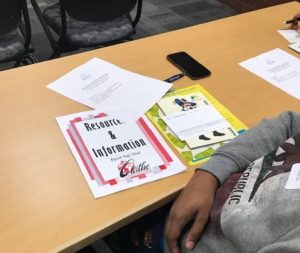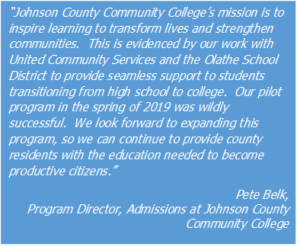UCS' Transitional Age Youth Initiative Hosts Dinners with Youth
A vital key to the success of any human service project is partnering directly with service recipients to ensure that programming reflects their needs and includes their participation. In partnership with the UCS led Transitional Age Youth (TAY) Planning Project, UCS participated in three events aimed at connecting directly with youth in Johnson County to learn more about their experiences, barriers, successes and needs. Framed as Feast and Feedback opportunities, members from the Transitional Age Youth Planning Project shared a meal and conversation with youth, from high school to 21 years old at CASA, Q-Space, and Hillcrest Transitional Living. Each event provided an opportunity to hear directly from youth and for the TAY Planning Project team to reflect on the goals and strategies of the project.
Each event offered insight into the varying experiences of youth in different contexts. At CASA, TAY Planning Project Leadership Team members spoke with youth who were engaged in foster care system; at Q-Space, the group met with LGBTQ youth, some of whom were still in high school, some who had graduated and moved on to college, and some who were working and living independently; and at Hillcrest Transitional Living, the TAY team met with youth who were engaged in a transitional living program where they are provided with an apartment, basic necessities, and on-site support. While each of these groups of youth had different backgrounds and experiences, some common themes emerged during the Feast and Feedback events:
- Importance of having a consistent, supportive adult in their lives. This key element was expressed at all three gatherings. Whether a parent, a foster parent, a CASA worker, or the lack of a supportive adult, the clear message from the youth is that having an adult in their lives whom they can trust, count on, and talk to is a vital and positive force in their lives.
- Moving from youth to adult services. When youth turn 18, many of the services change from youth to adult audiences. The Feast and Feedback dinners underscored the "transitional" component of youth 18- 24 years of age and how services may need to differentiate or create a bridge for youth in this age category in creating program responses.
- Bullying. Many youths spoke to bullying both online and in person and the impact bullying has on their sense of self and development. Continued education and training both on bullying and trauma informed care for service providers and educators is vital.
The Transitional Age Youth Planning Project has been made possible with funding from the REACH Healthcare Foundation.
UCS' Transitional Age Youth Initiative Partners Pilot Bridge to College Concept
 Johnson County Community College (JCCC) and Olathe Public Schools (OPS) completed the first stage of a pilot project designed to connect at-risk students to supports as they transition from high school to college. As part of the UCS led Transitional Age Youth Planning Project, the Bridge to College pilot aims to achieve positive educational and training outcomes for students with limited family supports, students who are in foster care, and students experiencing homelessness. These students often face barriers when entering college including challenges accessing and maintaining basic needs such as housing, transportation, and food, and a lack of information or understanding about expectations within the college environment.
Johnson County Community College (JCCC) and Olathe Public Schools (OPS) completed the first stage of a pilot project designed to connect at-risk students to supports as they transition from high school to college. As part of the UCS led Transitional Age Youth Planning Project, the Bridge to College pilot aims to achieve positive educational and training outcomes for students with limited family supports, students who are in foster care, and students experiencing homelessness. These students often face barriers when entering college including challenges accessing and maintaining basic needs such as housing, transportation, and food, and a lack of information or understanding about expectations within the college environment.
Both JCCC and OPS offer programs to connect their students with an individual who can provide support and guidance. Johnson County Community College offers supports to students on campus with the help of Success Advocates who are available to share tips for success, help with enrollment, explain College policies, procedures and deadlines, and match students with activities, resources and supports across campus. Olathe Public Schools has a mentoring program for students from elementary school through high school. Mentors meet with students regularly to provide support, encouragement, and to serve as a positive role model and trusting adult.
The Bridge to College pilot is designed to connect the mentoring program at OPS with the Student Success program at JCCC to ensure that students successfully bridge the gap between high school graduation and college. The two key components of the pilot were to engage the OPS mentors to continue supporting students beyond graduation through the first semester of college, and to provide both students and mentors with the information and tools needed as the students begin their college experience. Johnson County Community College designed four sessions for the OPS students in the pilot.
- Life After High School
- Getting to Know JCCC
- Getting Started at JCCC
- Tour of JCCC
 Success Advocates from the Student Success program facilitated the sessions, providing an opportunity for the OPS students to meet the Success Advocates and get to know them. Students and mentors will continue to meet regularly throughout the summer following high school graduation, and the first semester at JCCC. With the initial success of this first phase of the Bridge to College pilot complete, OPS and JCCC have committed to continue the program. Heather Schoonover, Community Liaison with OPS said "Olathe Public Schools appreciated working with Johnson County Community College on the 2019 Bridge to College mentoring program. Student feedback overwhelmingly showed the need to continue the learning sessions and mentoring opportunities."
Success Advocates from the Student Success program facilitated the sessions, providing an opportunity for the OPS students to meet the Success Advocates and get to know them. Students and mentors will continue to meet regularly throughout the summer following high school graduation, and the first semester at JCCC. With the initial success of this first phase of the Bridge to College pilot complete, OPS and JCCC have committed to continue the program. Heather Schoonover, Community Liaison with OPS said "Olathe Public Schools appreciated working with Johnson County Community College on the 2019 Bridge to College mentoring program. Student feedback overwhelmingly showed the need to continue the learning sessions and mentoring opportunities."
The Transitional Age Youth Planning Project has been made possible with funding from the REACH Healthcare Foundation.


